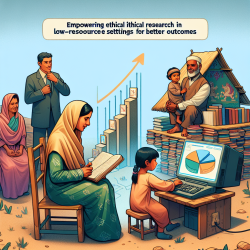As practitioners dedicated to improving the lives of children, we must constantly seek ways to enhance our methods and outcomes. The research article titled "Ethical issues in the design and conduct of stepped-wedge cluster randomized trials in low-resource settings" provides critical insights into the ethical considerations of conducting such trials, particularly in low-resource environments. Understanding and implementing these findings can significantly enhance our research practices and, ultimately, the services we provide through platforms like TinyEYE.
Stepped-wedge cluster randomized trials (SW-CRTs) are increasingly popular in health-related research. They involve the sequential rollout of an intervention across different clusters, such as schools or communities, until all clusters receive the intervention. This design can be particularly beneficial for evaluating interventions in real-world settings. However, SW-CRTs raise unique ethical issues, especially in low-resource settings, which we must address to ensure responsible research conduct.
Here are the key ethical considerations identified in the research and how they can be applied to our practice:
1. Classification of the Study: Research vs. Non-Research
One critical ethical issue is whether the SW-CRT should be classified as research or a service evaluation. This classification impacts whether the study requires ethical review and trial registration. The article argues that SW-CRTs should be classified as research due to their aim of providing generalizable evidence. As practitioners, we should ensure that our studies undergo ethical review and are registered in trial databases to protect participant welfare and guard against publication bias.
2. Justification for the Design
The justification for using an SW-CRT design is another ethical consideration. This includes the delayed rollout of an intervention to some clusters, which can be controversial if the intervention is believed to be effective. The article emphasizes the importance of clinical equipoise—ensuring there is sufficient uncertainty about the intervention's effectiveness to justify randomization. When planning our interventions, we must critically evaluate whether there is enough evidence to warrant a randomized trial and be transparent about the rationale behind the design.
3. Addressing Stakeholder Influence
In low-resource settings, stakeholder pressure can influence the order of intervention rollout, compromising the randomization process. The research highlights that such influence can jeopardize the causal inferences drawn from the study. To maintain the integrity of our research, we must resist external pressures and adhere strictly to randomization protocols.
4. Informed Consent and Ethical Approval
Obtaining informed consent and ethical approval is paramount, particularly in low-resource settings where participants may have limited understanding of research. The article suggests that consent should be obtained for all study procedures where possible. As practitioners, we must ensure that participants are fully informed about the study's purpose, benefits, risks, and their right to withdraw at any time.
5. Protecting Vulnerable Participants
Finally, protecting vulnerable participants is a core ethical principle. In the context of SW-CRTs, this includes ensuring that all participants eventually receive the intervention and that any delays do not result in harm. We must be vigilant in monitoring the impact of our interventions and be prepared to make adjustments to protect participant welfare.
By incorporating these ethical considerations into our research practices, we can ensure that our studies are conducted responsibly and that the findings are robust and generalizable. This commitment to ethical research will enhance the quality of the services we provide through TinyEYE, ultimately leading to better outcomes for the children we serve.
To read the original research paper, please follow this link: Ethical issues in the design and conduct of stepped-wedge cluster randomized trials in low-resource settings.










